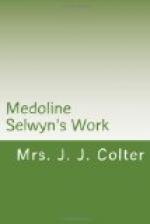P. S.—I must ask for perfect
secrecy on your part, and that no mention
whatever of my name, or letter, be made
at Oaklands. I trust to your
honor in the matter.
H. L.
I locked the letter up in my drawer and hastened to the dinner that certainly would not be kept waiting for me. I was hoping that the question about Mr. Bovyer’s book would be asked and answered in my absence; but was disappointed; for just as Mr. Winthrop arose from the table, at the close of dinner, Mrs. Flaxman mentioned the arrival of the books, and whence they came.
“It is quite profitable, chaperoning young ladies, you will find;” he said, dryly.
“But, Medoline does not wish to keep hers. She acted quite strangely about it; and insists that I must ask you, if she shall keep it.”
“Mr. Bovyer would feel aggrieved if we returned his present. I think you must keep it,” he said, turning to me.
“Most young ladies I have known are proud to get keepsakes from your sex.”
“I hope Medoline is not going to be a regulation young lady.”
“Why, Mr. Winthrop, what has caused you to change your mind? You used to condemn me for being so very unconventional.”
“I have made the discovery that you have something better in its stead,” he said, quietly. I looked up quickly to speak my thanks, but kept silent.
“Yes, Medoline is the only one of us that tries to do her duty by others. She has helped the poor more in the few months she has been here, than I have done in nearly twenty years.”
“But she confines her benefits to the poor and bereaved solely. She seems to forget the prosperous may be heavy-hearted,” Mr. Winthrop suggested with a smile.
“I do not intermeddle with that which lies beyond my skill to relieve. Any person can relieve poverty if they have money.”
“Possibly you are wise to confine your helpfulness to the simpler cases of sorrow.”
“I think the griefs of the rich are mostly imaginary and selfish. In this beautiful world, if we have our freedom, and health, and plenty of money, we are simply foolish to be down-hearted; only when death takes away our dear ones; and after a time the pain he gives ceases to smart.”
“You are very practical, Medoline, and look through spectacles dipped in sunshine.”
“Well, I believe she is right,” Mrs. Flaxman said, with an air of sudden conviction. “We are not half thankful enough for our blessings and persist in wearing the peas in our shoes for penance, when we might as well soften them like that wise-hearted Irishman. It would be a blessing if Medoline had medicine for other griefs than those poverty causes.”
I saw her cast a meaning look at Mr. Winthrop, which brought the color to my cheek, and set me to soberly thinking if I might not bring him surcease from bitter thoughts, and then it occurred to me, with all this commendation was there not grave danger of my getting uplifted unduly?




